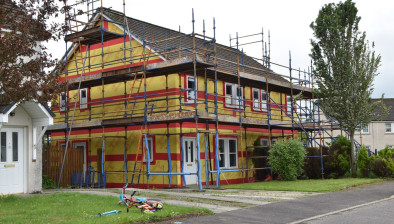UK: Scrapping new energy efficiency standards ‘cruel and irresponsible’

Prime Minister Rishi Sunak
Tenant organisations, trade unions, built environment bodies and energy companies have combined to criticise Prime Minister Rishi Sunak’s plans to change some of the UK Government’s key green policies, including proposals to water down housing energy efficiency standards and a weakening of targets to phase out gas boilers.
In autumn 2020, the government consulted on raising Minimum Energy Efficiency Standards (MEES) to EPC Band C (for new tenancies by 2025 and all tenancies by 2028). In his speech yesterday, Rishi Sunak said that he was scrapping these proposals.
In weakening the plan to phase out gas boilers, Mr Sunak said households would “never” be forced to “rip out their existing boiler and replace it with a heat pump”.
This will only be required when people are due to change their boiler anyway and even then, not until 2035 and exemptions will apply to those who will be bit the hardest “so they never have to switch at all”.
Mr Sunak also announced an increase to the boiler upgrade scheme, saying rather than banning boilers “before people can afford the alternative” the government is going to “support them to make the switch” to heat pumps.
He said: “The boiler upgrade scheme which gives people cash grants to upgrade their boiler will be increased by 50% to seven and a half thousand pounds.
“There are no strings attached. The money will never need to be repaid.”
Mr Sunak has also scrapped plans to force landlords to upgrade the energy efficiency of their properties, saying some property owners would have been forced to “make expensive upgrades” within two years and that would inevitably impact renters.
“You could be looking at a bill of £8,000, and even if you’re only renting, you’re more than likely to see some of that passed on in higher rents,” he said.
“That’s just wrong, so those plans will be scrapped.”
Tenant body Generation Rent said that cancelling higher standards for rented homes is “a colossal error by the government”.
“Leaving the impact on the climate to one side, it makes the cost of living crisis worse and damages renters’ health,” it added.
Dan Wilson Craw, deputy chief executive, said: “One in four private renters lives in fuel poverty and, without targets for landlords to improve their properties, they face many more years of unaffordable bills.
“Energy efficiency is also an essential part of a home’s quality. Backtracking leaves the government’s levelling up mission to halve the number of non-decent rented homes in shreds. It also undermines ministers’ promises to tackle the scourge of mould-ridden homes that killed Awaab Ishak.
“Both tenants and landlords need support to upgrade private rented homes, and the Prime Minister recognised that ‘big government grants’ help make it affordable. But without higher standards, landlords have no reason to accept tenants’ requests for improvements.
“The government’s dithering over these standards in recent years has led to the housing sector being unprepared for the original 2025 deadline. Ditching it completely is both cruel and out of proportion to what the Prime Minister wants to achieve.”
STUC general secretary Roz Foyer said the announcement is a disaster for workers in Scotland.
Ms Foyer added: “This is an incredibly desperate move from an increasingly desperate Prime Minister seeking whatever polling advantage he can muster at the expense of thousands of lives around the world impacted by climate change.
“Slowing climate action risks being a disaster for workers in Scotland and endangers thousands of manufacturing jobs that need futureproofing now. It puts us at a further competitive disadvantage in developing the industries of the future, and, ultimately will lead to higher energy bills and more fuel poverty.
“While the STUC has always been clear that there are practical difficulties to delivering net zero, these will only be overcome by investing in the industries of the future. This includes taking back control of our energy and transport systems and delivering a national retrofitting programme.
“Dither and delay are no answer to the crises facing working people across the country. The proposed announcement shows the UK Government isn’t prepared to invest in measures to build a greener and fairer economy. Workers across the country are already leading the charge to future-proof our workplaces and they need a government that encourages and backs their efforts rather than leaving them hanging out to dry.
“If Rishi Sunak won’t deliver the investment needed then he should at least devolve greater borrowing powers to the Scottish Parliament to enable them to do so.”
The Chartered Institute of Building (CIOB), which has long campaigned for a long-term national retrofit strategy, has also hit out at the Prime Minister’s scaling back.
Eddie Tuttle, director of policy, research and public affairs at CIOB, said: “Decarbonising homes and the wider built environment is vital to reach net zero so it’s disappointing to hear the Prime Minister scaling back energy efficiency targets and the commitments made in the Government’s own net zero growth plan published only six months ago, which refers to minimising reliance on fossil fuels.
“Energy consumption in buildings accounts for almost half of the UK’s carbon emissions so to deprioritise this issue is baffling when the government should instead be finding ways to support homeowners to retrofit their properties and improve their energy efficiency for the lowest possible cost.
“The Boiler Upgrade Scheme has had very low take up and in our view, increasing the grant available to homeowners will make little difference, as the remaining 25% will still be unaffordable for many households amidst a cost of living crisis.
“If government remains committed to reaching net zero by 2050, as they say they are, then they must set out how they plan to achieve this without reducing the reliance on carbon-based fuels to heat homes on the scale and at the pace required.”
Sarah Mukherjee MBE, CEO at IEMA, the professional body for environment and sustainability workers, added: “The transition to a net-zero economy by 2050 requires consistent policy if businesses are to have the confidence to invest in emissions reduction measures. Kicking the can down the road does not help with business planning and makes the UK a less attractive place in which to invest; it also makes it less likely that we’ll meet the 2050 target and avoid dangerous climate change.
“We have a real opportunity to invest in a greener economy by equipping our workforce with green skills and jobs to tackle the environmental challenges we face.
“The UK’s international leadership position on climate change has been gained by giving business the incentives to invest in clean technologies. A short-term ‘pause’ will undermine the UK’s reputation, and cost more in the long term.”
Vattenfall, which has formed a joint venture with Midlothian Council to deliver low carbon energy projects across the area, said the UK cannot afford a delay to net zero.
Jenny Curtis, managing director at Vattenfall Heat UK, said: “In the UK, one third of greenhouse gas emissions come from heating homes and buildings. Delaying the phase-out of gas boilers risks removing the incentive for building owners to switch to lower-carbon alternatives.
“The UK cannot afford to stall the deployment of low carbon heating by sending mixed messages about the future of fossil fuels. Companies will stop investing and the establishment of the supply chain and skills base that we so desperately need will fail to happen.”







